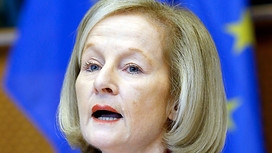
The eurozone’s new chief banking regulator has warned that some of the region’s lenders have no future and should be allowed to die, heralding a far tougher approach to supervision across the currency bloc.
欧元区新的银行业监管最高官员警告说,该地区的一些银行没有前途,应当允许它们死掉。此言预示着整个欧元区的银行监管方式将变得更加严厉。
In her first interview since taking charge of the euro area’s new banking overseer, the Single Supervisory Mechanism, Danièle Nouy also signalled she wanted to weaken the link between governments and the bloc’s banks that lies at the core of the region’s crisis by breaking with tradition and demanding lenders hold capital against their sovereign assets.
丹妮儿•诺伊(Danièle Nouy)在执掌欧元区新的银行监管机构——单一监管机制(Single Supervisory Mechanism)以来首次接受采访时还发出信号暗示,她希望削弱欧元区各国政府与银行之间的联系,此类联系是欧元区危机中的核心问题,具体做法是打破传统,要求银行针对各自的主权资产持有资本。
“One of the biggest lessons of the current crisis is that there is no risk-free asset, so sovereigns are not risk-free assets. That has been demonstrated, so now we have to react,” Mrs Nouy said. “What I would admit is that maybe it’s not the best moment in the middle of the crisis to change the rules – that’s possible. This being said, there is the possibility to do more and some countries are applying stricter rules.”
“当前危机的最大教训之一是,不存在没有风险的资产,因此主权债务并不是无风险的资产。这一点已被证明,所以我们现在必须做出反应,”诺伊表示。“我承认,危机期间也许不是改变规则的最佳时机——这是可能的。可话说回来,采取更多行动是可能的,一些国家正在实施更严格的规则。”
Global rules set before the financial crisis allowed lenders to hold no capital against their government bond portfolios, at the discretion of national regulators. But, despite the region’s crisis exposing the depth of the interconnections between the sovereigns and their banking systems, Europe’s lenders have been buying government bonds in increasing amounts.
按照金融危机之前制定的全球规则,银行对所持政府债券可以不持有资本,具体规定由所在国家监管机构自行决定。但是,尽管欧元区危机暴露了主权国家政府和本国银行体系之间互连的深度,但该地区银行在购买越来越多的政府债券。
Mrs Nouy agreed with Mario Draghi, the president of the European Central Bank, that the ECB’s upcoming health check of the region’s biggest lenders would need to see some institutions fail to be credible. “We have to accept that some banks have no future,” she said, parrying speculation that consolidation could save the currency bloc’s weakest lenders. “We have to let some disappear in an orderly fashion, and not necessarily try to merge them with other institutions.”
诺伊赞同欧洲央行(ECB)行长马里奥•德拉吉(Mario Draghi)的说法,即欧洲央行对欧元区大银行即将进行的健康检查如果要可信,就需要看到某些机构“不及格”。“我们不得不接受的是,有些银行没有前途,”她表示。她回避了有关通过合并可以拯救欧元区最弱银行的猜测。“我们必须让某些银行以有序方式消失,而不一定是试图让它们与其他机构合并。”
The appointment of Mrs Nouy, who joins the SSM from the helm of France’s banking supervisor, comes at a crucial time for the region’s lenders. Her first task is to oversee the health check, which will include an asset quality review and stress tests, before overseeing their supervision towards the end of this year.
此前诺伊是法国银行业监管最高官员,她的任命适逢欧元区银行处于关键时刻。她的第一项任务是领导健康检查工作,其内容将包括资产质量审查和压力测试,然后在接近今年底的时候督察对它们的监督。
Mrs Nouy said European lenders were in a better state than investors thought and hoped that the health check would prove this by providing more transparency on banks’ assets.
诺伊表示,欧洲各银行目前的情况好于投资者的判断,她希望健康检查将证明这一点,因为检查将给银行资产带来更大透明度。
Her readiness to countenance bank failures will trigger alarm among national politicians reluctant to see local lenders go to the wall. Italy has moved to reject the idea of setting up a “bad bank” for fear that it will focus market attention on the exposure of Italian banks to a rising level of non-performing loans and put the country’s credit rating at risk.
她准备让银行倒闭的态度,将引起不愿看到本国银行倒闭的各国政客警觉。意大利已拒绝设立一家“坏银行”的想法,担心此举引导市场关注该国银行对不良贷款的敞口越来越大,使该国的信用评级面临风险。


